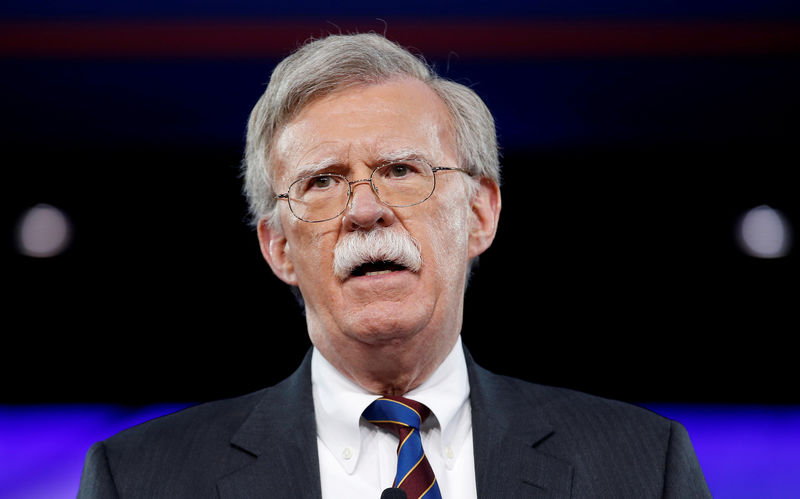LONDON (Reuters) - U.S. President Donald Trump's choice of John Bolton as national security adviser provoked strong reactions worldwide on Friday - and few stronger than in the bitterly-divided Middle East.
Some commentators saw it as another nail in the coffin of the Obama-era agreement between Iran and world powers to limit Tehran's nuclear ambitions, already cast into grave doubt by Trump himself.
Others expected Bolton to further undermine any remaining slender hopes of a "two-state solution" to the Israeli-Palestinian conflict emerging in the foreseeable future.
He has in recent months applauded Trump's plan to move the U.S. Embassy in Israel to Jerusalem. Naftali Bennett, a member of Prime Minister Benjamin Netanyahu’s security cabinet, called Bolton "an extraordinary security expert, experienced diplomat and a stalwart friend of Israel".
Left-leaning Israeli news website Haaretz was less enthusiastic, quoting 2016 comments by Bolton that the idea of two states, Israel and Palestine, existing side by side had "been dead for a long time".
He instead argued for the Palestinian territories to be placed under Egyptian and Jordanian sovereignty.
Lebanese newspaper al-Akhbar, aligned with the Shi'ite militant group and political movement Hezbollah, reported Bolton's appointment with the headline "Zionist Hawk in the White House", drawing attention to Bolton's historical calls for action against Iran.
"Bolton's appointment, combined with (Mike) Pompeo's nomination (for secretary of state) last week, significantly lowers the odds that Trump will stick to the nuclear deal beyond May," said Ellie Geranmayeh, senior policy fellow at the European Council of Foreign Relations.
"Both men have vocally opposed the nuclear deal, advocated for regime change in Iran and Bolton has repeatedly called for bombing rather than diplomacy as a fix to the nuclear issue."
Trump was surrounding himself with "like-minded advisers", Geranmayeh told Reuters, and "purging those who disagree".
But she said Bolton's position on the Iran agreement would meet strong resistance from U.S. Defense Secretary Jim Mattis and the European powers who are also signatories.
"DANGEROUS RIDE"
European officials expressed alarm at the personnel changes in Washington. "The writing is on the wall, unless we Europeans can present a forceful and united front to save the Iran deal," said one EU diplomat.
Another commented: "Any moderating factor in White House foreign policy is being lost. We hoped the 'adults in the room' would win over Trump, but now the adults are leaving."
Some observers of Iran and the region saw storm clouds gathering. "President Trump has now chosen a war cabinet," said Ali Alfoneh, senior fellow at the Atlantic Council.
Bolton was a leading advocate of the 2003 invasion of Iraq and has called for a change of government in North Korea.
Any new conflict between the United States and Iran would undermine moderates in Iran and strengthen radical forces, Alfoneh said.
"Bolton was a champion of ‘us-versus-them’ foreign policy," tweeted Mohamed ElBaradei, former head of the International Atomic Energy Agency and a Nobel Peace Prize winner.
"We should brace ourselves for a rough & dangerous ride."
Turkey's response to the appointments of Pompeo and Bolton was cautious. "We hope these changes of duty will be a means to further strengthen the continuing efforts to solve the problems that have existed between our countries for a long time," a foreign ministry spokesman said.
Among the international reactions, Moscow too struck a note of reserve.

"That is not a question for us, it is for the U.S. administration," a Kremlin spokesman said when asked about Bolton's nomination.